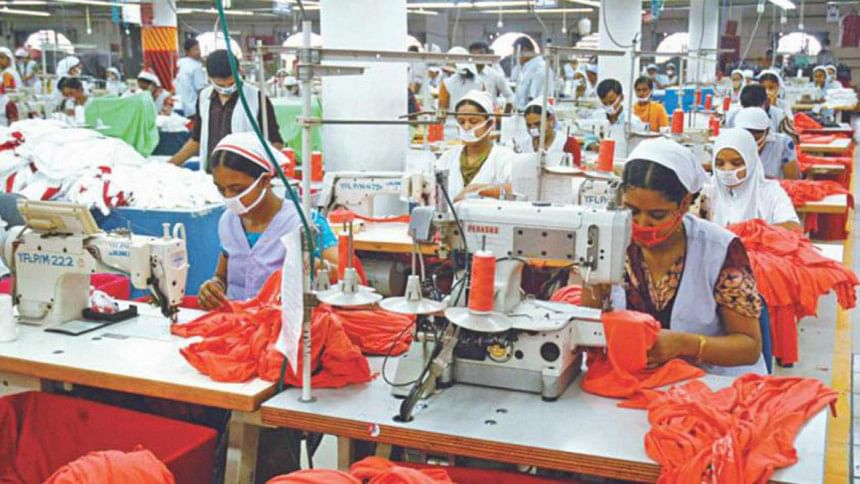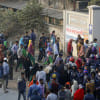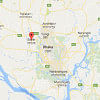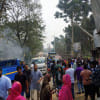Tk 8,000 a month

The government has raised the minimum monthly wage for 4.4 million garment workers by around 51 percent to Tk 8,000 from the existing Tk 5,300 with effect from December.
Md Mujibul Haque Chunnu, state minister for labour and employment, announced this at a press briefing at his secretariat office yesterday after the fifth and final meeting of the wage board formed in January.
However, some trade union leaders rejected the proposed hike and urged the prime minister to review it as soon as possible. They demand that the minimum monthly wage be fixed at Tk 16,000.
Speaking at the briefing, the state minister said that of the Tk 8,000, Tk 4,100 is basic wage, Tk 2,050 house rent, Tk 600 medical allowance, Tk 350 conveyance allowance and Tk 900 food expenditure.
Chunnu also said the owners' representative at a recent meeting of the board proposed fixing the minimum monthly wage at Tk 7,000.
But at a meeting with the board members on Wednesday, Prime Minister Sheikh Hasina asked the owners' representative to add Tk 1,000 to the proposed wage of Tk 7,000.
“Finally, all the board members agreed to the prime minister's proposal ....,” Chunnu said hoping all sides would accept it.
He further said there is no scope for not paying the minimum wage of Tk 8,000 at the entry level (7th grade). The wage of the workers in six other grades would also be increased accordingly.
“The government announced the minimum wage for the garment workers a little earlier than the scheduled time because the election-time government, slated to be formed next month, cannot make such a decision.
“We will publish the gazette notification as soon as possible ... We have a lot of time before the new wage structure comes into effect,” Chunnu mentioned.
There will be no change in the seven grades of the garment workers. The details of the grades would be published in the gazette notification, he added.
Prices of garment items, costs of production and daily expenditures of the workers have been considered in determining the minimum wage.
The minimum wage was fixed at Tk 5,300 the last time in 2013, up from Tk 3,000 in 2010. It was Tk 1,662.50 in 2006, Tk 940 in 1994 and Tk 627 in 1985.
At the first meeting of the current board in July, the owners' representative proposed that the monthly minimum wage be fixed at Tk 6,350, while the workers' representative suggested that it should be Tk 12,020.
Yesterday, Siddiqur Rahman, the owners' representative and president of Bangladesh Garment Manufacturers and Exporters Association, said, “At one stage, we proposed Tk 7,000. But later the prime minister intervened and proposed Tk 8,000. We accepted her proposal.”
The new wage will be effective from December when the five-year tenure of the previous wage structure expires. The workers will get the new wage in January next year, he said.
Board Chairman Syed Aminul Islam, also a retired district judge, said, “We also thought that Tk 8,000 as the minimum wage is logical, and finally recommended it.”
Begum Shamsunnahar, workers' representative in the board and also women affairs secretary of the Awami League, said, “I also accepted Tk 8,000 as the minimum wage following the prime minister's intervention.”
However, Nazma Akter, president of Sammilita Garments Sramik Federation, a workers' rights group, urged the government to slightly raise the basic wage from the announced Tk 4,100 as other benefits such as bonuses and compensations are determined based on the workers' basic pay.
The government should also provide subsidies for the workers' accommodation, food and education so that they can save some money from their wages, said Nazma, who represented the workers in the 2006 wage board.
“The owners may increase the production target after the wage hike. We have to monitor that the workers are not overburdened with work due to the increased production target. Their health issues should also be addressed,” she added.
Several leaders from two other rights groups -- Garment Sramik Trade Union Kendra and Bangladesh Garment Sramik Sanghati -- also echoed her views.
Earlier in December 2016, hundreds of workers staged massive demonstrations in Ashulia and Savar for a wage hike, prompting nearly 100 factories to suspend operation. They demanded that the minimum monthly wage be fixed at Tk 16,000.
A number of workers were arrested and terminated from jobs during the agitation. Some union leaders were also detained.
The factories reopened following negotiations between the government and trade unions.
Later, in a rare move in December last year, the garment factory owners on their own came up with a proposal for forming a wage board mainly to avert further unrest.

 For all latest news, follow The Daily Star's Google News channel.
For all latest news, follow The Daily Star's Google News channel. 








Comments